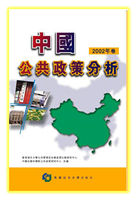One of the mainland's top State Council researchers told a CityU seminar on 1 February that China's World Trade Organization (WTO) membership will breed new economic opportunities as well as a number of stresses for the country.
At the one-day seminar, China's WTO Membership: Impacts on Economic Relations Between Hong Kong and the Mainland -- organized by the
Centre for Comparative Public Management and Social Policy --
Professor Long Guoqiang, Deputy Director General of the Department of Foreign Economic Relation Studies of the
State Council's Development Research Centre, discussed the fundamental changes that will come with the mainland's entry to WTO, as well as the challenges it will pose to Hong Kong.
China's WTO membership, he predicted, will bring economic growth, development in trade and increases foreign investments. "Economic growth, however, will not be equally distributed in all sectors and regions. The sectors, which have an edge, may enjoy greater growth and profit whereas those which are less competitive, such as agriculture, or those used to be well-protected may be hard hit," said Professor Long. "How to address these problems will become a critical issue for the government."
As for Hong Kong, China's WTO membership will bring closer economic ties with the mainland. "Hong Kong's contribution to China's economic development in the past 20 years cannot be undermined," said Professor Long. "While supporting the mainland's economic development, Hong Kong also benefited from the mainland's rapid economic growth and open policy. Thus Hong Kong will also benefit if China continues to develop rapidly. And if Hong Kong can grasp this opportunity, the benefits can be even greater."
At the seminar, Professor Long also discussed the establishment of a free trade zone. As there is no precedence for such a zone between a developing economic entity and a free trade port, the free trade zone will be a special and innovative one, he said.
In conjunction with the seminar,
City University of Hong Kong Press launched
Analysis of Public Policies of China 2002. The book, written by local and mainland researchers and edited by the Centre for Comparative Public Management and Social Policy and the Centre of Public Policy Study of
Chinese Academy of Social Sciences, details China's major public policies and how they were formulated.
The book contains an introduction and 12 chapters on topics related to public finance management, changes in the government's function in economic management, macro-economic policy, and human and natural resources policies. "The book is of great reference value in
Hong Kong, overseas and even the mainland," said
Professor Anthony Cheung Bing-leung, Associate Director of the Centre for Comparative Public Management and Social Policy. Since last year,
China has been actively promoting the analysis of public policies. "Such kinds of analytical studies will be of great value be it in the academic or practicing fields," said Professor Cheung.
Last year, the Centre for Comparative Public Management and Social Policy and the Centre of Public Policy Study of Chinese Academy of Social Sciences joined hands in publishing the Analysis of Public Policies of China 2001. Both books can be purchased at fine bookstores and by contacting City University of Hong Kong Press.
*** This story appears in City University Staff Newsletter, Linkage No.209 ***


